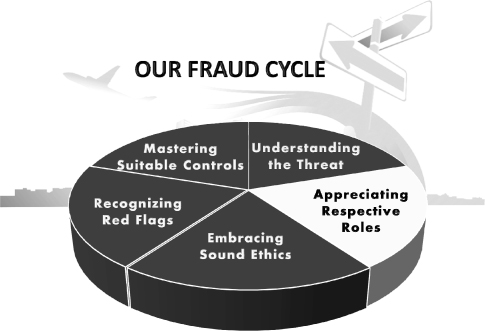6
Fraud Smart Skills Profile
In the previous chapter we looked at roles and responsibilities in relation to preventing and dealing with fraud. Now we need to make sure that everyone possesses the right skills to discharge these additional duties at work.
As you know, this book is based around the Fraud Smart cycle, which covers five key aspects of helping non-specialists get to grips with fraud at work. It is repeated in Figure 6.1.
Figure 6.1 The Fraud Smart cycle.

This chapter sits within the second part of the Fraud Smart cycle, Appreciating Respective Roles, and covers the need to ensure that the new-look employee has the right skill set to cope with the way fraud is carried out today.
WHAT CAN GO WRONG?
If we fail to live up to the expectation that the entire workforce is alert to the threat of fraud, much could go wrong. It is one thing to dictate new skills for employees, but quite another to ensure that these skills are firmly in place.
We can consider the way problems can arise by looking at two brief illustrative case studies taken from the UK and the USA. The first involved a huge fraud.
CASE STUDY
A company director who defrauded a giant IT company by stealing computer equipment was jailed for more than two years. The director made 1200 claims for replacement parts to the company, over two years, worth around £1.6 million. His assistant, who had worked under him for eight ...

